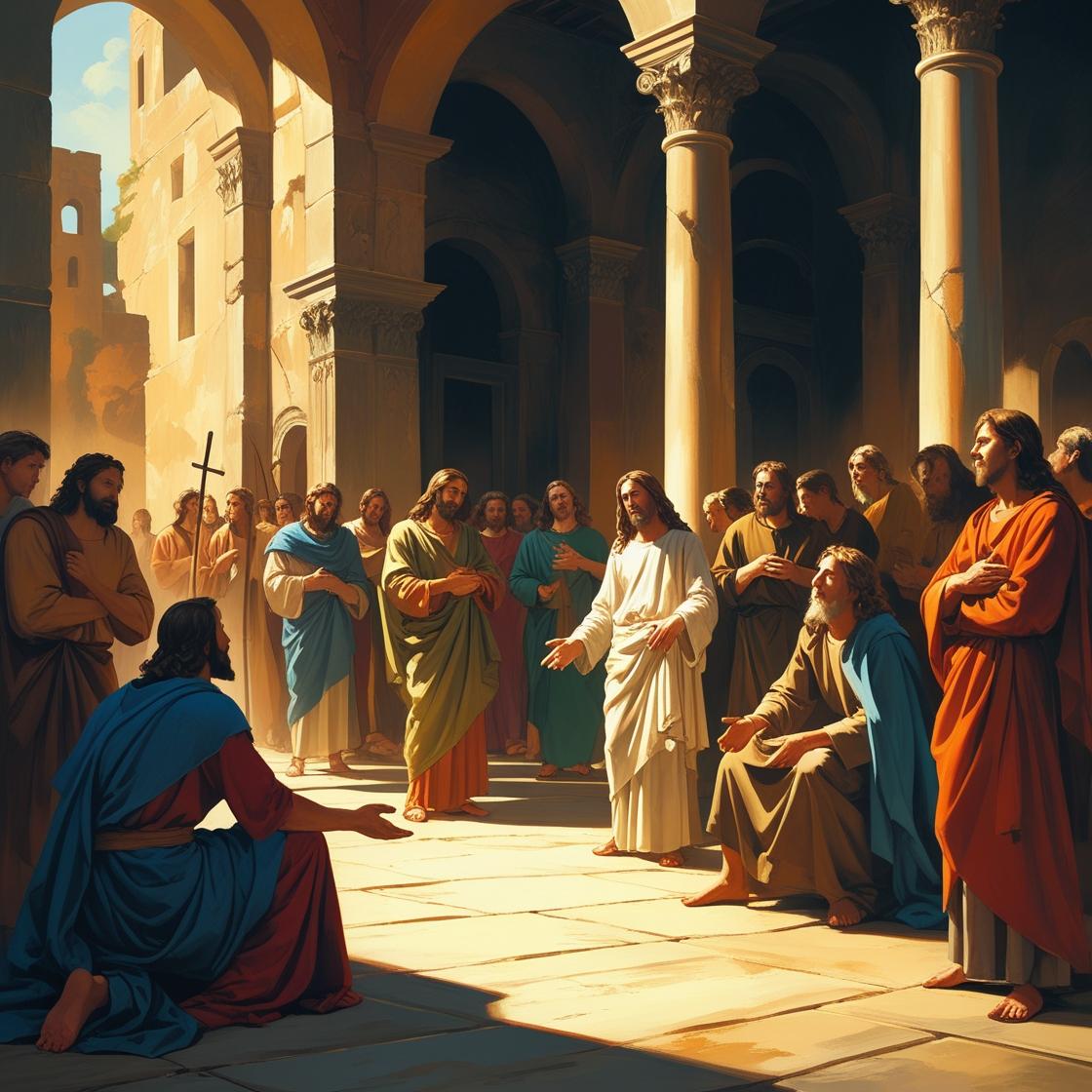The parables of Jesus are found in the Synoptic Gospels (Matthew, Mark, and Luke) and are short stories or metaphors used by Jesus to convey spiritual and moral lessons.
They often use everyday situations to illustrate deeper truths about the Kingdom of God, human nature, and ethical living.
Below is a detailed explanation of some of the most significant parables, along with their meanings, ranging from simple to complex interpretations.
1. The Parable of the Sower (Matthew 13:1-23, Mark 4:1-20, Luke 8:4-15)
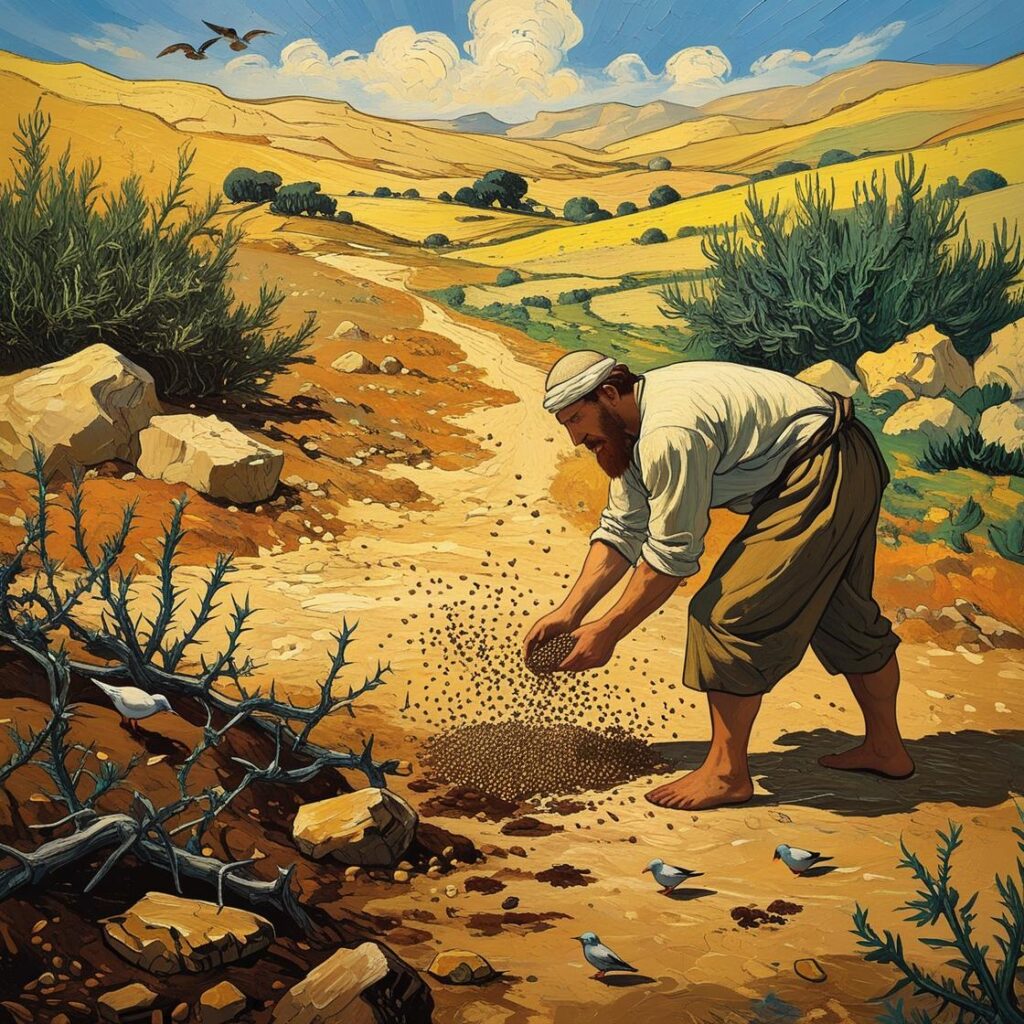
- Story: A sower scatters seeds, which fall on different types of ground: a path, rocky soil, thorny soil, and good soil. Only the seeds on good soil produce a fruitful harvest.
- Simple Meaning: The condition of the soil represents how people receive God’s Word. Some reject it, others accept it but eventually fall away, while some fully embrace it and bear fruit.
- Deeper Meaning: The parable highlights the importance of cultivating a receptive heart to God’s message. It also reflects the challenges of faith, such as persecution, worldly distractions, and shallow commitment, and how we react to them.
2. The Parable of the Good Samaritan (Luke 10:25-37)

- Story: A man is beaten and left for dead. A priest and a Levite ignore him, but a Samaritan helps him and pays for his care.
- Simple Meaning: We should help others in need, regardless of their background or our prejudices.
- Deeper Meaning: The parable challenges societal norms and religious hypocrisy, emphasizing that true neighborly love transcends ethnic, religious, and social boundaries. It also reflects God’s mercy and the call to live out our faith through action.
3. The Parable of the Prodigal Son (Luke 15:11-32)

- Story: A younger son demands his inheritance, squanders it, and returns home in shame. His father forgives him and celebrates his return, while the older son resents the forgiveness.
- Simple Meaning: God forgives those who repent, no matter how far they have strayed.
- Deeper Meaning: The parable illustrates God’s unconditional love and grace. It also critiques self-righteousness (represented by the older son) and highlights the joy of reconciliation and restoration.
4. The Parable of the Mustard Seed (Matthew 13:31-32, Mark 4:30-32, Luke 13:18-19)

- Story: A tiny mustard seed grows into a large tree, providing shelter for birds.
- Simple Meaning: Small beginnings can lead to great outcomes.
- Deeper Meaning: The Kingdom of God starts small (e.g., Jesus’ ministry) but will grow into something vast and inclusive, offering refuge and hope to all.
5. The Parable of the Lost Sheep (Matthew 18:10-14, Luke 15:3-7)

- Story: A shepherd leaves 99 sheep to search for one lost sheep and rejoices when it is found.
- Simple Meaning: God cares deeply for every individual and seeks out those who are lost.
- Deeper Meaning: The parable emphasizes God’s relentless love and the value of each person. It also critiques religious leaders who neglect the marginalized.
6. The Parable of the Talents (Matthew 25:14-30)
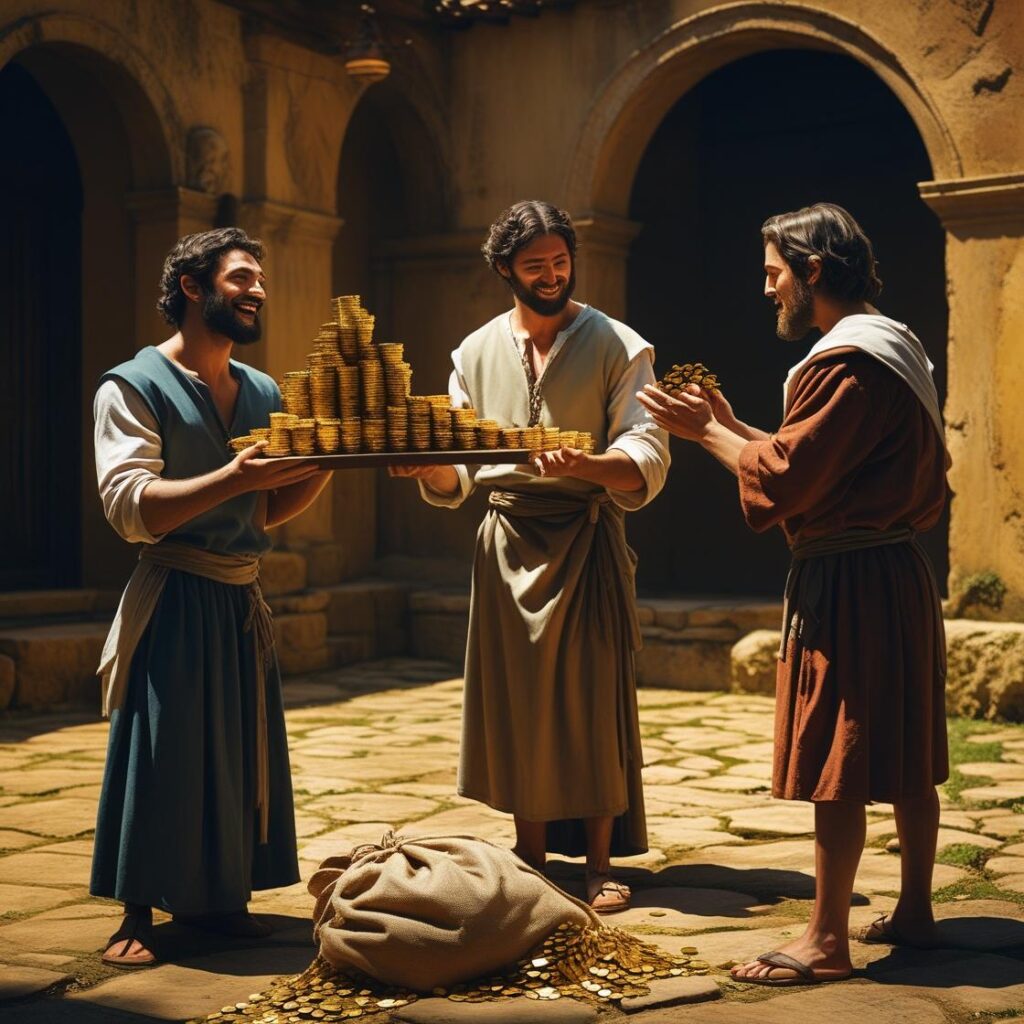
- Story: A master gives his servants different amounts of money (talents). Two invest and double their money, but one buries his out of fear. The master rewards the first two and punishes the third.
- Simple Meaning: Use your gifts and resources wisely; don’t waste them.
- Deeper Meaning: The parable teaches stewardship, accountability, and the importance of taking risks for the Kingdom of God. It also warns against fear and complacency.
7. The Parable of the Wheat and the Tares (Matthew 13:24-30)

- Story: A farmer sows good seed, but an enemy sows weeds among the wheat. The farmer allows both to grow until the harvest, when they are separated.
- Simple Meaning: Good and evil coexist in the world, but they will be separated in the end.
- Deeper Meaning: The parable addresses the problem of evil and the patience of God, who delays judgment to allow for repentance. It also reassures believers that justice will ultimately prevail.
8. The Parable of the Rich Fool (Luke 12:13-21)

- Story: A rich man builds bigger barns to store his wealth but dies before he can enjoy it.
- Simple Meaning: Don’t be greedy or materialistic; life is fleeting.
- Deeper Meaning: The parable critiques the pursuit of wealth and self-sufficiency, urging a focus on eternal values and generosity.
9. The Parable of the Pharisee and the Tax Collector (Luke 18:9-14)
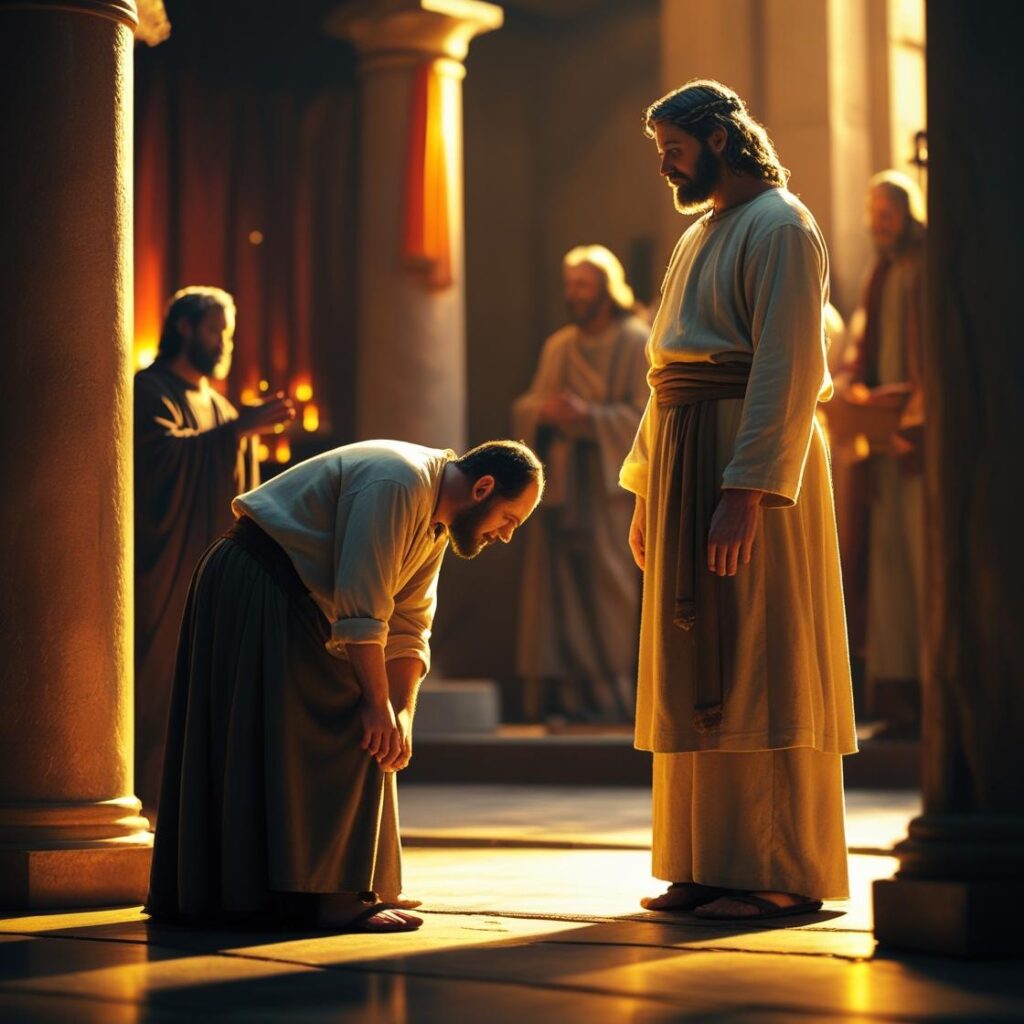
- Story: A self-righteous Pharisee prays boastfully, while a humble tax collector asks for mercy. Jesus says the tax collector is justified before God.
- Simple Meaning: Humility is more pleasing to God than pride.
- Deeper Meaning: The parable critiques religious hypocrisy and emphasizes that salvation comes through humility and repentance, not self-righteousness.
10. The Parable of the Workers in the Vineyard (Matthew 20:1-16)

- Story: A landowner hires workers at different times of the day but pays them all the same wage. Those who worked longer complain.
- Simple Meaning: God’s grace is generous and fair, even if it seems unfair by human standards.
- Deeper Meaning: The parable challenges notions of merit and entitlement, emphasizing that God’s Kingdom operates on grace, not human effort or comparison.
11. The Parable of the Ten Virgins (Matthew 25:1-13)

- Story: Ten virgins await a bridegroom. Five are prepared with oil for their lamps, but five are not and miss the celebration.
- Simple Meaning: Be prepared for Christ’s return.
- Deeper Meaning: The parable warns against spiritual complacency and emphasizes vigilance, readiness, and the importance of a genuine relationship with God.
12. The Parable of the Unforgiving Servant (Matthew 18:21-35)
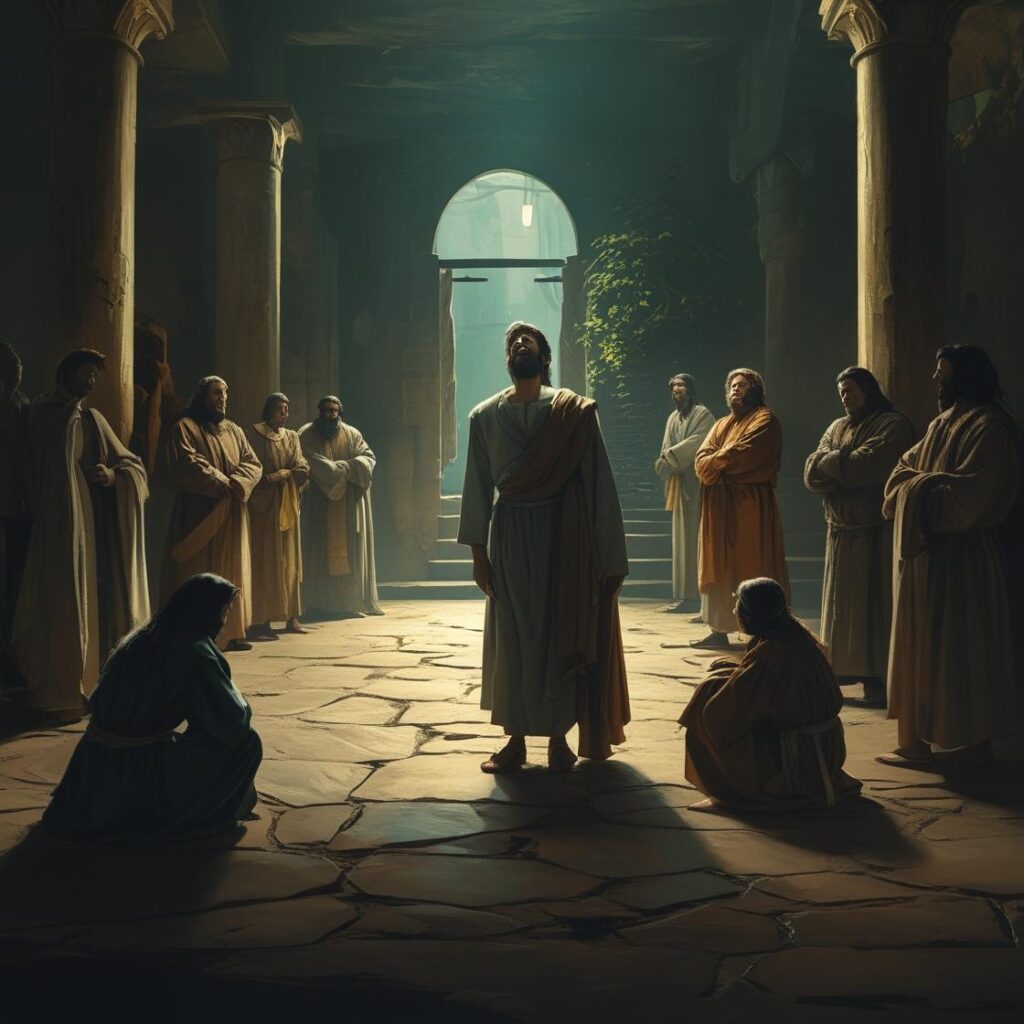
- Story: A servant is forgiven a huge debt but refuses to forgive a small debt owed to him. The master punishes him for that act of wickedness.
- Simple Meaning: Forgive others as God has forgiven you.
- Deeper Meaning: The parable highlights the enormity of God’s forgiveness and the expectation that we extend that forgiveness to others. It also critiques hypocrisy and a lack of mercy.
13. The Parable of the Hidden Treasure and the Pearl of Great Price (Matthew 13:44-46)

- Story: A man finds a hidden treasure and sells everything to buy the field. Similarly, a merchant sells all he has to buy a priceless pearl.
- Simple Meaning: The Kingdom of God is worth sacrificing everything for.
- Deeper Meaning: The parables emphasize the incomparable value of the Kingdom and the radical commitment it requires.
14. The Parable of the Great Banquet (Luke 14:15-24)

- Story: A man invites guests to a banquet, but they make excuses. He then invites the poor, the crippled, and the blind.
- Simple Meaning: God’s invitation is open to all, but many reject it.
- Deeper Meaning: The parable critiques religious exclusivity and highlights God’s inclusive grace, which prioritizes the marginalized and rejects the self-satisfied.
15. The Parable of the Two Sons (Matthew 21:28-32)

- Story: A father asks his two sons to work in the vineyard. One refuses but later obeys; the other agrees but takes no action.
- Simple Meaning: Actions matter more than words.
- Deeper Meaning: The parable critiques superficial religiosity and emphasizes the importance of genuine repentance and obedience.
We can see that Jesus’ parables are multi-layered, offering simple moral lessons while also revealing profound truths about God’s nature, human behavior, and the Kingdom of God.
These parables challenge us to reflect on our lives, attitudes, and priorities, often subverting conventional wisdom and calling for radical faith and transformation.

